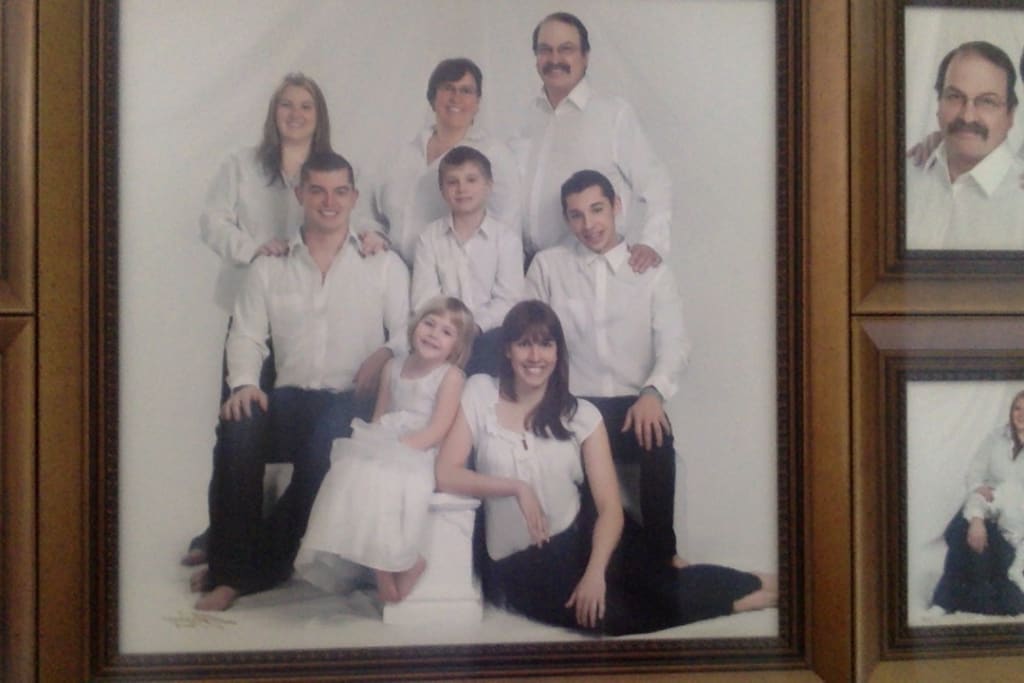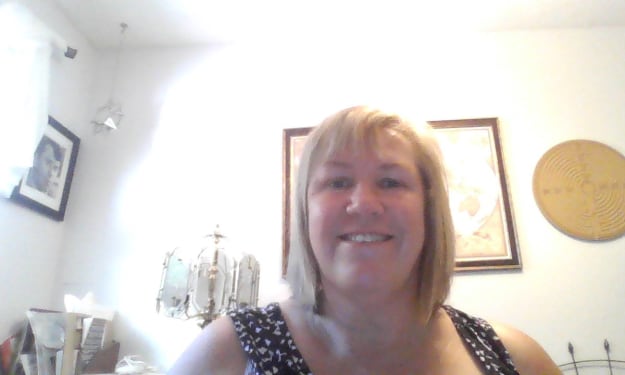Six Lovelies and How They Grew
Growing an Open-Kin Family

My husband and I have six children, five of whom are adopted. Our three eldest, adopted children all have a variety of diagnosed irregularities, including: attention deficit hyperactivity disorder (ADHD), oppositional defiance disorder, prenatal exposure to alcohol and/or drugs or both, resulting in fetal alcohol spectrum disorder (FASD), or learning disabilities, complex behaviors and attachment disorders—in no particular order. We have dealt with many challenges over the years!
However, I don’t think any of those issues are quite as challenging as raising our two youngest, adopted children who are “kin adoptions.” Our 13-year-old son came to us at the age of three weeks, after his biological parents, one of them our oldest adopted son, became overwhelmed and afraid at the realization that they were not ready to be parents at age 16 and 17. They ran away, leaving our then grandson with his biological, maternal, great-grandparents, who were not well enough nor capable to take on the full-time care of an infant. The maternal great-grandparents called me by telephone to tell me, “The kids have run away and we can’t keep the baby and we’re calling the CAS.” My heart dropped to the floor. I had already fallen in love with my "wee" grandson and there was no way I wanted him to experience abandonment, as his young father had before him. The call came just before my husband arrived home from work, asking me, as he always did, “What have you cooked up for me tonight?” My reply was, “Well, we are leaving immediately to go pick up our grandson, so that the Children’s Aid Society does not have to be called.” We did that and to make our grandson’s story much shorter, we were able to find his biological parents and bring them home, just long enough to have them receive some counseling and independent legal advice. My son and his then girlfriend, the biological mother, were able, after much support, to make the decision to agree to a private adoption, with openness. Our grandson became our youngest son. We love to play around and introduce him as our “grandson-son.” He loves the confused look on people’s faces. He is a wonderfully mischievous boy! We wanted to adopt him, so that he would not simply be in our temporary custody, only to be removed later in life. We believe strongly, that a child needs life-long stability… A forever family. It took incredible amounts of time, energy and lots of love to help our eldest son and his girlfriend, the biological mother, to do what was in the best interests of their little boy. With support, they were able to gift him with a stable, loving and secure home to be raised in; and they gifted themselves their youth and ongoing access and involvement in their son’s life.
It all sounds lovely but, in truth, it was an extremely challenging and heartbreaking time. Our son and his girlfriend struggled with feelings of shame, loss and grief. They had longed for a baby. Like many young people, they dreamed of cuddles, kisses, snuggles and joy. They were not prepared for crying, colic, sleepless nights, expensive formula and diapers and the loss of their freedom. The reality of parenting a baby, full-time, was more than they were able to handle. Their hearts and souls desired and wanted so desperately to be the best parents they could be. Once our sweet baby boy was living with us and we had officially adopted him, our eldest son, for a season, began to challenge our parenting. He would come home at the time, sporadically, as would his girlfriend and they would want to “be a parent for a day.” We had to set boundaries, while trying to respect them for who they were in our young son’s life. This was no easy feat. Our son and the biological mother experienced anger, rage, tears, frustration and deep, deep grief for the loss of their child and their dreams. There was also pain for my husband and I because, while we had to care for our new baby, we still had to care for and support our “teenaged-father-son," whom we love deeply. It was so hard to see him go through the dark valley of loss. He too had been an abandoned child and this experience was triggering all kinds of emotion in our son and the young mother, who had her own family-of-origin history. We still needed to parent this child-father, our eldest son, who needed us to support him while he grieved this loss, but, in his mind and heart, he lost his child to us. Can you imagine wanting to be held and loved by the very person who has your baby? That can be the pain of kin adoption.
As parents to him, we needed to continue to demonstrate our love for him, accept him and forgive his mistakes that, for a time, placed the baby at risk. However, as responsible parents we also had to ensure that he would face the consequences, both positive and negative, of his decision to have a baby with his girlfriend, as a teenager—then, to leave the baby and subsequently agree to the private adoption. So, while raising the baby, we had to continue to raise our child’s father. This is such a complex and multi-layered family dynamic. It would be impossible to convey the ongoing angst and day-to-day struggles we experienced and overcame, in order to keep our family together. We are proud to say that with much determination, love, forgiveness and a desire to be successful, we have come out not too badly. Thirteen years later, our eldest son is, “Daddy J” (name withheld for privacy) and we are "daddy and mummy" to our youngest boy. Daddy J is now over 30-years-old and he has learned how to enjoy his son’s company, while allowing us to be the parents. It has been a long, hard road of lessons learned for all of us. We can now be joyful together as a family. Our youngest son knows who he is and that he belongs in this forever family and that his Daddy J belongs here too. He calls us mummy and daddy, but will still remind me, “Really, I know you’re my grandmum-mum” and he laughs. Sadly, his biological mother slowly receded from his life when he was about seven-years-old. She has always been welcome in his life and in our home, but she expressed that it was just “too hard” to watch him with me, “the other mother.” This has been heartbreaking for our son. We talk openly about how much his “tummy mummy” wanted him and loved him. She loved him so much, that she made the hardest decision a mother could ever make and agreed to let him live in a safe, loving and forever home. He gets it—and hopes that one day she will be able to be a part of his life again. We hope for that day too.
Our youngest daughter was adopted just one week short of turning two-years-old. Although she is not a “blood relative,” as most kin-adoptees are, she was considered a kin, because her mother is the only child of our best friends. We knew her mother from the day of her birth, and to her, we are Aunty J and Uncle G (names withheld for privacy). Her parents were and continue to be close, life-long friends. Sadly, our young niece had developed a serious drug addiction and was unable to safely parent her little girl. The biological grandparents were not able to present a permanent plan for many reasons, but were heartbroken that they might lose their only granddaughter.
We presented a plan to the CAS, as Aunt and Uncle. The goal was to adopt this little girl, so that her grandparents and her biological parents could remain involved in her life. Our hope was that if her biological mother was able to seek treatment for her addiction, that a future relationship might be possible. But, in the meantime, the grandparents could remain involved. Initially, things did not move in this direction and the biological mother became more and more lost in the world of addiction and criminal behavior. Her behavior was erratic and, at times, dangerous to our family. Again, learning how to set very clear boundaries with this young mother was vital. Naturally, her parents, the grandparents, found it very difficult to have us set boundaries for their daughter and at times, they would unintentionally, undermine our parenting with our youngest daughter. They felt guilty, and often still do feel guilty, that they were not able to adopt their granddaughter. The way they handled this, earlier on, was to ply her with material things—toys, books, candy, expensive things too, that were not age-appropriate. Again, we had to work on setting boundaries and remain firm in our stance as “the parents”—that they had to respect our values, beliefs and norms and it was up to us how we would raise our little girl. Needless to say, remaining friends during these stressful times of working out our roles has been extremely challenging. Many people tell us how lucky our friends are and how lucky their daughter is that we offered to adopt as kin, so that they can continue to play a role in our daughter's life. However, there are many tough times, and we are all stretched to our limits, as we learn to navigate the new relationships. We are no longer just “old friends” or “Aunty J or Uncle G.” We are now the people who have their grandchild and in the mother’s eyes, “her child.” Kin adoption is not easy.
Kin adoption is amazing, too! I wanted to convey the challenge, the struggle and the heartbreak that is linked to kin adoption, because I think it’s all too easy for people to say, “how wonderful,” “how lucky,” “how blessed…" and yes, it is all those things, too. But, it is never easy. Our youngest has been with us for six years now, and after lots of hard work and raw honesty and boundary setting, we have found peace in our relationships. Our young niece has made some wonderful gains and recently received her One Year Medal for sobriety. She is not out-of-the-woods yet, but she is finally on the road to recovery. We are so proud of her accomplishments. She is learning, like Daddy J, to enjoy the times she shares with our daughter. She is able to be with our daughter, with our supervision, and she is realizing that she will always be a part of her biological daughter’s life. With time, she has learned that we mean what we say and we do what we say we’re going to do. She is learning to trust, as did Daddy J, that we all love “our” children and that “our” children need all the love they can get from all of the important people in their lives—their adoptive parents and siblings, and their biological parents or “Tummy Mummies and Daddies,” as we call them. As kin families, we learn that not one of us is perfect, or better, or more needed than the other—but that together, we form a big, crazy and loving family for “our” children. The anguish, the heartbreak, the grief and feelings of loss can be, and are, worked through. What comes out in the end is a unique, special and loving, Kinship Family. We would not change that for anything.
About the Creator
Joyce Hamelin
Joyce is a parent to 6 children & Nana to 3. Five of her children are adopted. She is a professional Social Worker, College Professor, Public Speaker & Life Celebrations Officiant. Dabbling in writing is a passion and dream work.






Comments
There are no comments for this story
Be the first to respond and start the conversation.